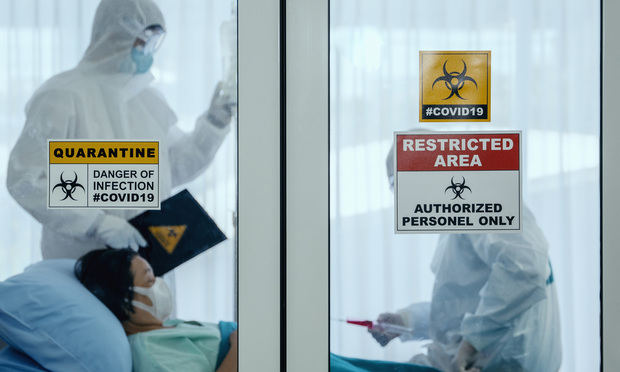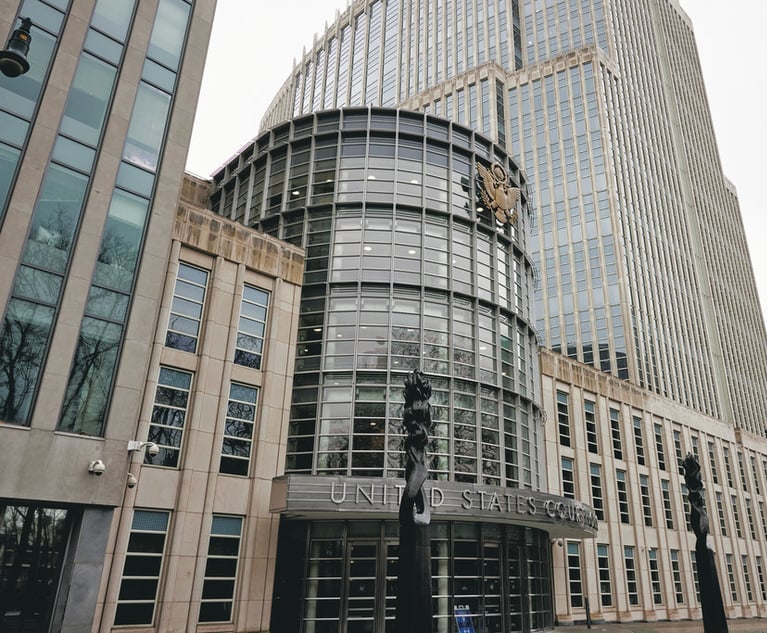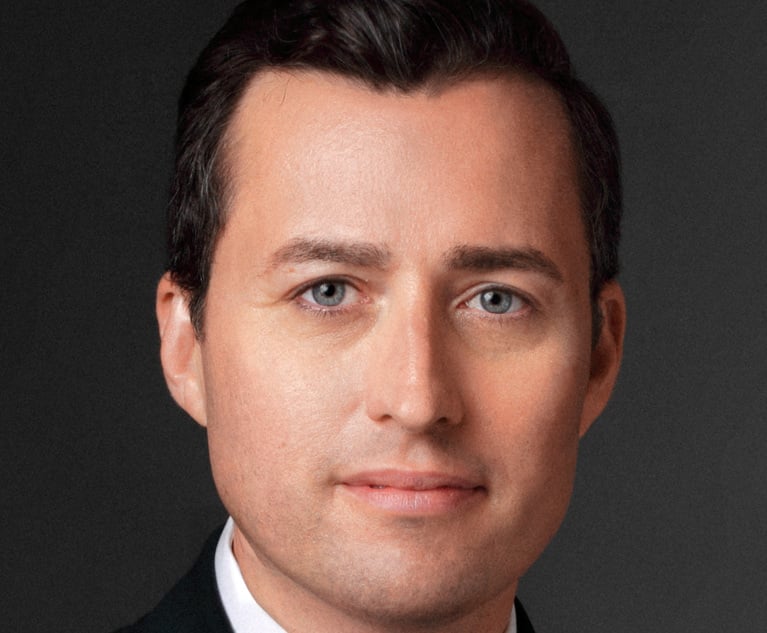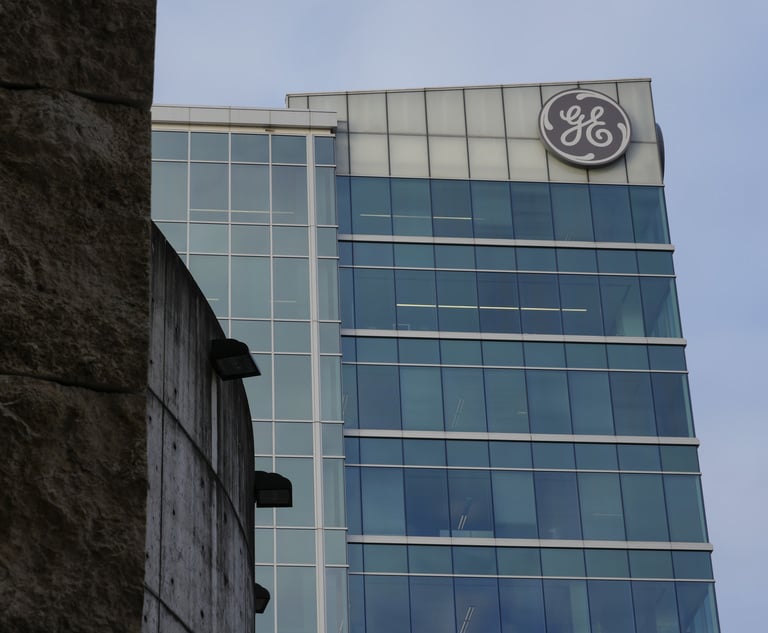COVID-19 and Business Interruption Insurance: Insureds Face Potential Roadblocks to Coverage
As these legal issues begin to wind themselves through the courts, businesses should take necessary steps to reserve their rights, but should not rely on the immediate payment of insurance proceeds during these difficult times.
April 03, 2020 at 11:00 AM
9 minute read
 As New York businesses face unprecedented losses as the result of the COVID-19 pandemic and the associated civil closure orders, many find themselves turning to their business interruption insurance policies as a source of relief. However, they could be surprised to find that coverage for the greatest business interruption New York has ever faced may be far from a certainty.
As New York businesses face unprecedented losses as the result of the COVID-19 pandemic and the associated civil closure orders, many find themselves turning to their business interruption insurance policies as a source of relief. However, they could be surprised to find that coverage for the greatest business interruption New York has ever faced may be far from a certainty.
The central issue, and one that carriers are already using as a basis to deny coverage, comes from the standard requirement that the business interruption be the result of "direct physical loss of or damage to" the affected property. Accordingly, billions of dollars in insurance will (or will not) be available to New York businesses based on whether the coronavirus or the associated civil orders constitute "direct physical loss of or damage to" a covered property. While the language in individual insurance policies differs, and even minor variations in language can have a significant impact on whether coverage is available, New Yorkers will undoubtedly face many of the same legal challenges in seeking coverage.
Lessons From Hurricane Sandy
After New York's last collective disaster, Hurricane Sandy, many businesses found themselves unable to operate as a result of governmental orders and a shutdown of utilities. Business owners filed claims seeking relief under their business interruption coverage, and many of these cases ended up in litigation. Newman Myers Kreines Gross Harris, P.C. v. Great N. Ins. Co., 17 F. Supp. 3d 323, 329 (S.D.N.Y. 2014) was a prime example.
In Newman, the insured, a business that could not access its office solely as a result of Con Edison's decision to shut off electricity, argued that the phrase "direct physical loss or damage" did not require actual structural damage to the covered premises, but rather that there need only have been "an initial satisfactory state that was changed by some external event into an unsatisfactory state." Id. at 329. Based on this, the insured argued that the loss of power constituted "direct physical loss of or damage to" the property.
However, relying largely on the Appellate Division, First Department's decision in Roundabout Theatre Co. v. Contl. Cas. Co., 751 N.Y.S.2d 4, 5 (1st Dept. 2002), which addressed a business interruption claim as the result of the ordered closure of a theatre after a nearby construction accident, the Newman court rejected this argument and held that that the "loss of use" of a property is not encompassed in the phrase "direct physical loss or damage to." Accordingly, under current New York case law, it appears unlikely that a business interruption caused solely by any type of civil closure order would be covered if the policy requires the loss be due to "direct physical loss or damage."
At the same time, while the Newman court rejected that the loss of electricity met the requirement, after summarizing several out-of-state cases involving invisible noxious gases, it went on to note that under New York law "the critical policy term at issue, requiring 'physical loss or damage,' does not require that the physical loss or damage be tangible, structural or even visible." Newman, 17 F. Supp. at 330. Accordingly, whether a business will be able to obtain coverage may turn on its ability to show that the virus, though invisible, was physically present at the affected property. Here, insureds may ultimately have difficulty establishing the actual presence of COVID-19 without having locations physically tested. Considering the current limitation on PPE and other resources, as well as other issues facing businesses, this is unlikely to be a priority and may even be an impossibility.
While physical testing may not be practical, tracking and memorializing positive COVID-19 tests for employees and other individuals who were present at the affected location may be helpful in establishing the necessary "physical loss or damage." As businesses are permitted to inquire into whether their employees tested positive for COVID-19, they should take this important step, as long as they keep the employee's response (or identity) confidential.
Other Possible Claims Available
However, even if coverage is ultimately not available under general business interruption coverage, other insurance provisions may provide other bases for coverage. Three common lines of coverage that may apply are communicable disease, civil authority, and ingress-egress provisions, though there are others.
Communicable disease coverage typically provides coverage where there is "actual not suspected presence of communicable disease" and may include other requirements such as an associated governmental order. As such, insureds are likely to face the same evidentiary issue on needing to prove the presence of the virus—though they should be able to avoid the "physical loss or damage" argument. Unfortunately, communicable disease coverage traditionally provides a lower level of coverage when compared to business interruption insurance and may otherwise limit recovery to costs associated with decontamination rather than lost revenue.
Insureds may also have specific civil authority coverage, which is designed for losses that are the result of a government order. However, while seemingly available under the current circumstances, these clauses often include similar "direct physical loss of or damage to" conditions precedent, coupled with a geographical limitation. Accordingly, unlike under the communicable disease coverage, a business may not be required to demonstrate the physical presence of the virus at the actual location versus in a defined area. However, insureds may still face the same issue regarding whether the virus constitutes "physical loss or damage." Civil authority coverage may also be limited to only a select number of days.
Ingress-egress provisions may also be applicable and are designed to provide businesses coverage when the physical damage occurs, not to the insured premises, but elsewhere, preventing entrance to the business (i.e., a car accident in front of your business). Again, this coverage typically requires "physical damage." However, as the geographic limitations tend to be less limited (if not absent altogether) in this type of coverage, it is worth noticing a claim under these provisions as well.
Exclusions May Apply
Even where an insured believes they are able to demonstrate available coverage, whether it is available will also be impacted by any exclusions in the policy. While exclusions are read narrowly and are generally interpreted in favor of insureds under New York law, after H1N1, many insurers added relevant exclusions for viral outbreaks. While experienced counsel may be able to effectively argue around the application of certain provisions, the reality is that many policies will include proper and applicable exclusions.
Possible Legislative Relief
New York courts, like most, have not directly addressed the key question of whether a virus constitutes physical damage to property. And while in the months ahead countless courts will address this very question, some states are not waiting on the judicial system.
On March 16, 2020, New Jersey Bill A-3844 was introduced. The Bills states:
Notwithstanding the provisions of any other law, rule or regulation to the contrary, every policy of insurance insuring against loss or damage to property, which includes the loss of use and occupancy and business interruption in force in this State on the effective date of this act, shall be construed to include among the covered perils under that policy, coverage for business interruption due to global virus transmission or pandemic, as provided in the Public Health Emergency and State of Emergency declared by the Governor in Executive Order 103 of 2020 concerning the coronavirus disease 2019 pandemic.
While the New Jersey Bill has since been pulled after criticism from the insurance industry, it is still possible it will be reintroduced. Though such a law would undoubtedly face significant challenges from the insurance industry on constitutional and other grounds, the adoption of a similar statute in New York would place incredible pressure on the insurance industry to work with the state to establish some type of relief fund for affected businesses.
What To Do Now To Maximize a Chance of Coverage
As these legal issues begin to wind themselves through the courts, businesses should take necessary steps to reserve their rights, but should not rely on the immediate payment of insurance proceeds during these difficult times. Accordingly, businesses should take the following proactive steps to maximize their chances of receiving coverage:
- Identify and review their insurance policies;
- Provide prompt general notice of any claim to their insurance carrier as provided for in their policy in a manner calculated to encompass as many claims as possible;
- Document and memorialize all lost business and proceeds in as much detail as possible;
- Document and memorialize individuals with positive COVID-19 tests who have been at the covered location;
- Continue to mitigate damages and operate business to the maximum extent possible, including taking advantage of federal, state and municipal programs established to assist small businesses in this difficult time;
- If a business receives a denial letter from a carrier that appears generic in nature, it should push back and seek as much detail as possible;
- Businesses may want to contact their elected representatives and push for New York to press legislation similar to that proposed in NJ defining Covid-19 as "physical damage" to property; and
- Consult with counsel on their specific policy and its application to the business.
Evan Bolla is a partner and general counsel for Harris St. Laurent in New York. His practice focuses on insurance recovery, executive employment, and other commercial matters.
This content has been archived. It is available through our partners, LexisNexis® and Bloomberg Law.
To view this content, please continue to their sites.
Not a Lexis Subscriber?
Subscribe Now
Not a Bloomberg Law Subscriber?
Subscribe Now
NOT FOR REPRINT
© 2025 ALM Global, LLC, All Rights Reserved. Request academic re-use from www.copyright.com. All other uses, submit a request to [email protected]. For more information visit Asset & Logo Licensing.
You Might Like
View All
Insurance Company Sues Over 180 Health Care Providers for Fraud Under RICO
3 minute read
New York Court of Appeals Tightens Pleading Standards Against Insurance Policyholder
7 minute read
Amid Growing Litigation Volume, Don't Expect UnitedHealthcare to Change Its Stripes After CEO's Killing
6 minute read
GE Agrees to $362.5M Deal to End Shareholder Claims Over Power, Insurance Risks
2 minute readTrending Stories
- 1We the People?
- 2New York-Based Skadden Team Joins White & Case Group in Mexico City for Citigroup Demerger
- 3No Two Wildfires Alike: Lawyers Take Different Legal Strategies in California
- 4Poop-Themed Dog Toy OK as Parody, but Still Tarnished Jack Daniel’s Brand, Court Says
- 5Meet the New President of NY's Association of Trial Court Jurists
Who Got The Work
J. Brugh Lower of Gibbons has entered an appearance for industrial equipment supplier Devco Corporation in a pending trademark infringement lawsuit. The suit, accusing the defendant of selling knock-off Graco products, was filed Dec. 18 in New Jersey District Court by Rivkin Radler on behalf of Graco Inc. and Graco Minnesota. The case, assigned to U.S. District Judge Zahid N. Quraishi, is 3:24-cv-11294, Graco Inc. et al v. Devco Corporation.
Who Got The Work
Rebecca Maller-Stein and Kent A. Yalowitz of Arnold & Porter Kaye Scholer have entered their appearances for Hanaco Venture Capital and its executives, Lior Prosor and David Frankel, in a pending securities lawsuit. The action, filed on Dec. 24 in New York Southern District Court by Zell, Aron & Co. on behalf of Goldeneye Advisors, accuses the defendants of negligently and fraudulently managing the plaintiff's $1 million investment. The case, assigned to U.S. District Judge Vernon S. Broderick, is 1:24-cv-09918, Goldeneye Advisors, LLC v. Hanaco Venture Capital, Ltd. et al.
Who Got The Work
Attorneys from A&O Shearman has stepped in as defense counsel for Toronto-Dominion Bank and other defendants in a pending securities class action. The suit, filed Dec. 11 in New York Southern District Court by Bleichmar Fonti & Auld, accuses the defendants of concealing the bank's 'pervasive' deficiencies in regards to its compliance with the Bank Secrecy Act and the quality of its anti-money laundering controls. The case, assigned to U.S. District Judge Arun Subramanian, is 1:24-cv-09445, Gonzalez v. The Toronto-Dominion Bank et al.
Who Got The Work
Crown Castle International, a Pennsylvania company providing shared communications infrastructure, has turned to Luke D. Wolf of Gordon Rees Scully Mansukhani to fend off a pending breach-of-contract lawsuit. The court action, filed Nov. 25 in Michigan Eastern District Court by Hooper Hathaway PC on behalf of The Town Residences LLC, accuses Crown Castle of failing to transfer approximately $30,000 in utility payments from T-Mobile in breach of a roof-top lease and assignment agreement. The case, assigned to U.S. District Judge Susan K. Declercq, is 2:24-cv-13131, The Town Residences LLC v. T-Mobile US, Inc. et al.
Who Got The Work
Wilfred P. Coronato and Daniel M. Schwartz of McCarter & English have stepped in as defense counsel to Electrolux Home Products Inc. in a pending product liability lawsuit. The court action, filed Nov. 26 in New York Eastern District Court by Poulos Lopiccolo PC and Nagel Rice LLP on behalf of David Stern, alleges that the defendant's refrigerators’ drawers and shelving repeatedly break and fall apart within months after purchase. The case, assigned to U.S. District Judge Joan M. Azrack, is 2:24-cv-08204, Stern v. Electrolux Home Products, Inc.
Featured Firms
Law Offices of Gary Martin Hays & Associates, P.C.
(470) 294-1674
Law Offices of Mark E. Salomone
(857) 444-6468
Smith & Hassler
(713) 739-1250






